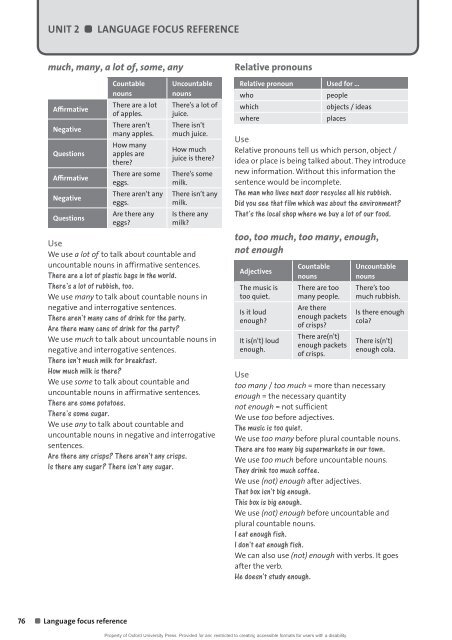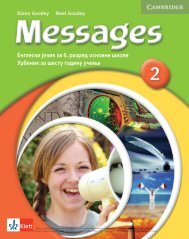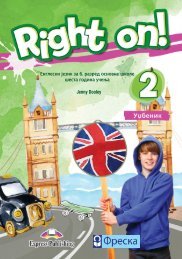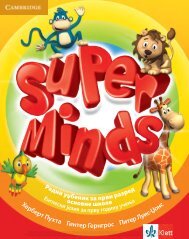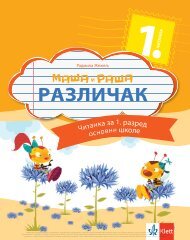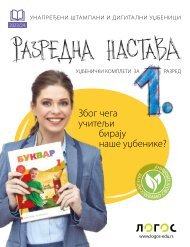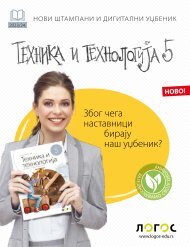Енглески језик 7, радна свеска, старо издање, Нови Логос
- No tags were found...
You also want an ePaper? Increase the reach of your titles
YUMPU automatically turns print PDFs into web optimized ePapers that Google loves.
UNIT 2<br />
LANGUAGE FOCUS REFERENCE<br />
much, many, a lot of, some, any<br />
Affirmative<br />
Negative<br />
Questions<br />
Affirmative<br />
Negative<br />
Questions<br />
Countable<br />
nouns<br />
There are a lot<br />
of apples.<br />
There aren’t<br />
many apples.<br />
How many<br />
apples are<br />
there?<br />
There are some<br />
eggs.<br />
There aren’t any<br />
eggs.<br />
Are there any<br />
eggs?<br />
Uncountable<br />
nouns<br />
There’s a lot of<br />
juice.<br />
There isn’t<br />
much juice.<br />
How much<br />
juice is there?<br />
There’s some<br />
milk.<br />
There isn’t any<br />
milk.<br />
Is there any<br />
milk?<br />
Use<br />
We use a lot of to talk about countable and<br />
uncountable nouns in affirmative sentences.<br />
There are a lot of plastic bags in the world.<br />
There’s a lot of rubbish, too.<br />
We use many to talk about countable nouns in<br />
negative and interrogative sentences.<br />
There aren’t many cans of drink for the party.<br />
Are there many cans of drink for the party?<br />
We use much to talk about uncountable nouns in<br />
negative and interrogative sentences.<br />
There isn’t much milk for breakfast.<br />
How much milk is there?<br />
We use some to talk about countable and<br />
uncountable nouns in affirmative sentences.<br />
There are some potatoes.<br />
There’s some sugar.<br />
We use any to talk about countable and<br />
uncountable nouns in negative and interrogative<br />
sentences.<br />
Are there any crisps? There aren’t any crisps.<br />
Is there any sugar? There isn’t any sugar.<br />
Relative pronouns<br />
Relative pronoun<br />
who<br />
which<br />
where<br />
Used for …<br />
people<br />
objects / ideas<br />
places<br />
Use<br />
Relative pronouns tell us which person, object /<br />
idea or place is being talked about. They introduce<br />
new information. Without this information the<br />
sentence would be incomplete.<br />
The man who lives next door recycles all his rubbish.<br />
Did you see that film which was about the environment?<br />
That’s the local shop where we buy a lot of our food.<br />
too, too much, too many, enough,<br />
not enough<br />
Adjectives<br />
The music is<br />
too quiet.<br />
Is it loud<br />
enough?<br />
It is(n’t) loud<br />
enough.<br />
Countable<br />
nouns<br />
There are too<br />
many people.<br />
Are there<br />
enough packets<br />
of crisps?<br />
There are(n’t)<br />
enough packets<br />
of crisps.<br />
Uncountable<br />
nouns<br />
There’s too<br />
much rubbish.<br />
Is there enough<br />
cola?<br />
There is(n’t)<br />
enough cola.<br />
Use<br />
too many / too much = more than necessary<br />
enough = the necessary quantity<br />
not enough = not sufficient<br />
We use too before adjectives.<br />
The music is too quiet.<br />
We use too many before plural countable nouns.<br />
There are too many big supermarkets in our town.<br />
We use too much before uncountable nouns.<br />
They drink too much coffee.<br />
We use (not) enough after adjectives.<br />
That box isn’t big enough.<br />
This box is big enough.<br />
We use (not) enough before uncountable and<br />
plural countable nouns.<br />
I eat enough fish.<br />
I don’t eat enough fish.<br />
We can also use (not) enough with verbs. It goes<br />
after the verb.<br />
He doesn’t study enough.<br />
76 Language focus reference<br />
Property of Oxford University Press. Provided for and restricted to creating accessible formats for users with a disability.


